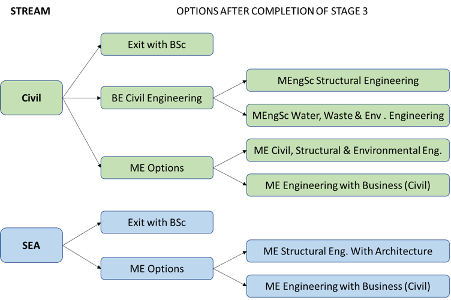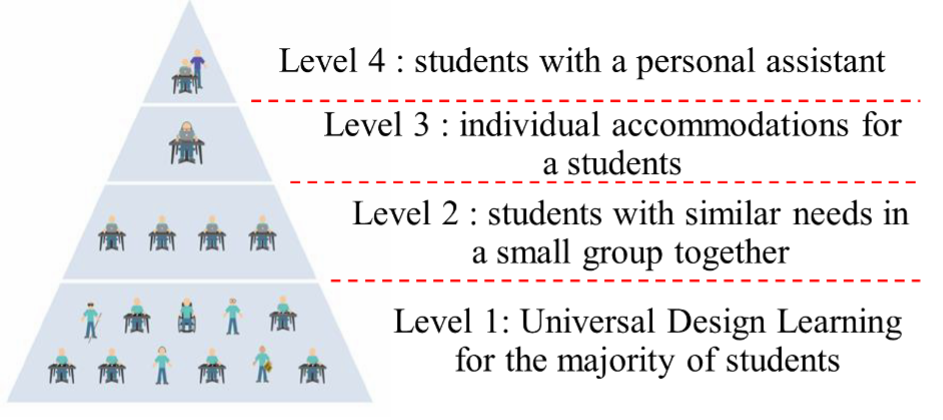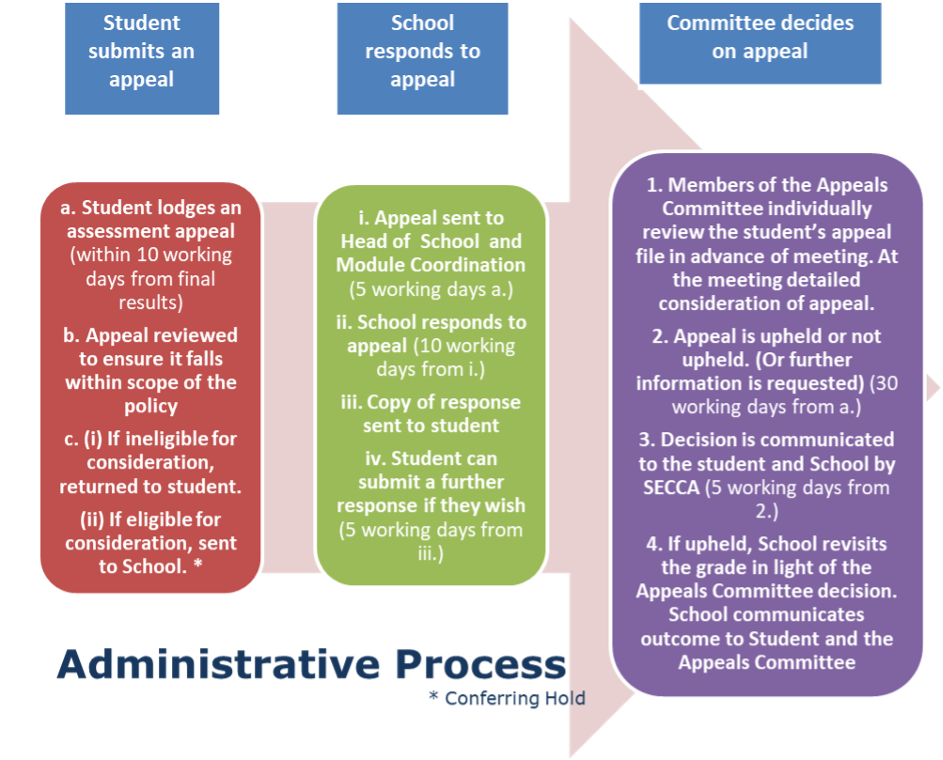

Academic Advice
This webpage aims to provide an overview of the academic advising system at the UCD School of Civil Engineering. At the top of the page, you will be able to see the faculty members and their roles in academic advising. Below, the different dropdown menus in the webpage contain an overview of the supports and activities of interest to the students in the UCD School of Civil Engineering. In every section, links and relevant contacts have been included in case you wish to gather further information on a given topic
Academic Advisors


Associate Professor Arturo Gonzalez
Programme Director for the BSc and ME in Structural Engineering with Architecture, and the MEngSc in Structural Engineering
View Profile

Associate Professor Patrick J Purcell
School Head of Teaching and Learning, and Academic Exchange Coordinator
View Profile
Associate Professor Shane Donohue
Deputy Head of School, the Chair of the Newstead Staff-Student Forum, and the Year Head for Stage 4
VIEW PROFILE
Lecturer/Assistant Professor Beatriz Martinez-Pastor
Programme Director for the BE Civil Engineering Infrastructure Programme in the Chang'an Dublin International College
View Profile
Lecturer/Assistant Professor Ekin Özer
Programme Director and Year Head for Stage 5 students for the ME Civil Engineering Dual Degree Programme with Columbia University
VIEW PROFILE
Lecturer/Assistant Professor Md Salauddin
Programme Director for MEngSc Water, Waste & Environmental Engineering
VIEW PROFILE
Lecturer/Assistant Professor Sarah Cotterill
Year Head for Stage 3 students and Safety Coordinator
View Profile
Lecturer/Assistant Professor Yuangsheng Hu
Programme Director for the BE Civil Engineering and ME in Civil, Structural and Environmental Engineering, and Year Head for Stage 5 students.
View ProfileAcademic Advice
The aim of the work placement module (CVEN40730) is to give students the opportunity to gain on-the-job experience in a structured setting for a period of c. 8 months. Work placements commence in January of each year, prior to which, students will have typically completed 3.5 years of engineering education. The placement involves work outside UCD on a full-time basis. Students will not normally be able to complete other credit-bearing modules during the placement period. Work placement opportunities are sourced in civil and structural engineering design companies and in contracting companies. Students make applications for these placements and may be offered interviews by the placement providers. Students may alternatively recommend a placement provider for approval by the Programme Board. Overseas placements are also permitted. A member of the academic staff will be appointed as academic supervisor to liaise with the student during the period of their work placement. The placement provider will nominate a sponsor within the organisation to oversee the placement. A programme of work will be agreed between the University and the sponsor, to ensure that students can meet the learning outcomes associated with this module using the opportunities that are available during the scheduled period of placement. The supervisor will maintain contact with the student, and the student's sponsor, during the work placement period. Special arrangements for supervision apply in the case of students on placement overseas.
Attendance requirements are agreed in consultation with the student, supervisor and sponsor and may in certain cases exceed the minimum requirements of the module descriptor.
- Students are required to keep a Diary of their experience, to be shown to the module coordinator or academic supervisor on request. Students must complete a Final report, summarising their experiences, with specific reference to the “General Learning”, “Technical Learning” and “Personal Learning” headings.
- An assessment will be sought from an employer or Academic Supervisor commenting on the engagement of the student with the process and highlighting any particular achievements.
- Students may be required to present for Oral Examination on completion of placement.
The module is assessed on a Pass/Fail basis. Successful completion of the module will result in the award of the credits, with a module grade "P" assigned. This module is grade point neutral and will not contribute directly to the Degree GPA. An unsuccessful attempt at the module will result in the credits not being awarded. Failure to meet the learning outcomes associated with this module represents grounds for failure. Remediation of failure may be discussed with the module co-ordinator.
Links of interest: (opens in a new window)Internship/Work Practice Experience: Guidelines and Good Practice
The Internships Managers (from UCD Careers) liaise with UCD Careers Network, to organise the sessions on preparation of CVs, and interview techniques, and they advise students of the timing of these sessions. The College's Internship Managers also provide details of available roles on to the Connect platform, such that students have access to appropriate information relating to specific roles. Students submit their CVs through this platform, and employers access these and arrange interviews with students.
Meet the Work Placement Coordinator: (opens in a new window)Associate Professor John O'Sullivan
Contact for the Internship Managers at the College of Engineering and Architecture: (opens in a new window)eainternships@ucd.ie
UCD is a partner with over 350 universities around the world allowing students to go on an exchange for one or two semesters. In the case of European universities, this exchange occurs under the Erasmus Programme, whereas agreements with international universities happen within the Exchange Programme. In all cases, tuition is paid to UCD and waived in the host university.
In the School of Civil Engineering, there are agreements with the following international universities:
- Australia – University of Melbourne, University of Queensland, University of Western Australia.
- Canada – McGill University, Queen’s University Kingston, University of British Columbia.
- China – Chang'an University, University of Nottingham Ningbo.
- New Zealand – University of Auckland.
- Singapore – Nanyang Technological University, National University of Singapore.
- USA – Georgia Tech, Purdue University, University of California, University of Colorado Boulder, University of Connecticut, University of Illinois at Urbana-Champaign, University of Maryland, University of Miami, University of Texas Austin, University of Vermont.
In the School of Civil Engineering, there are agreements with the following European universities:
- France – INSA Lyon, ESTP Paris (École Spéciale des Travaux Publics, du Bâtiments et de l'Industrie), EIVP (École des Ingénieurs de la Ville de Paris).
- Germany – Technische Universität München.
- Switzerland – EPFL (Ecole polytechnique fédérale de Lausanne).
- UK – University of Birmingham, University of Edinburgh, University of Nottingham.
When applying for an exchange, students should consider aspects such as the location of the host University, the range of courses on offer, their GPA in UCD and programme minimum requirements, the academic calendar, potential language requirements/barriers, the cost of living/finances, the accommodation options, as well as their plans. In terms of financial help, there are different scholarships/grants available:
Erasmus Programme: the Erasmus grant amounts to approximately €300 or €350 per calendar month depending on the destination. There is also additional funding available for upper-level SUSI grantees and HEAR students.
Exchange Programme: there is a scholarship of €500 per semester for students at (opens in a new window)Universitas 21 partners in Latin America and Asia. Moreover, some partners in Asia offer scholarships to which students can apply e.g. DUO Scholarship in Korea, a Japanese scholarship; and funding is available for Chang'an University.
Outgoing exchange students must meet the following requirements:
Stage 1 complete, with stage GPA 3.00 or higher.Earned 30 credits in the autumn trimester of stage 2, with a GPA of 3.00 or higher grades less than C- in any core module.
In the case that a student does not meet the requirement (i), they may be considered for the Erasmus/Exchange program if the following conditions are met:
No grade less than D- in any module (core, option or elective).No more than two grades less than C- in core modules. No more than one grade less than C- in a core module in any trimester.Stage 1 complete, with stage GPA 3.00 or higher.Earned 30 credits in the autumn trimester of stage 2, with a GPA of 3.50 or higher.
Finally, all qualifying students are subject to final approval by the Engineering Programme Board Student Applications Committee (EPBSAC).
The application process is carried out through SISWeb and students are encouraged to attend the Information sessions and the Study Abroad Fair. These events usually run through October and November, when the application opens. The application deadline is typically at the end of January and a decision should be expected by March at the latest. If the application is successful, pre-departure sessions will take place between February and April.
Links of interest:
ERASMUS & Non-EU Exchange in the College of Engineering and Architecture
UCD Global Outbound Exchange Students
Contacts of interest:
Daria Cornavan - International Mobility Officer Inside of Europe (Dedicated email: (opens in a new window)outgoing.erasmus@ucd.ie)
Stephie Forde - International Mobility Officer Outside of Europe (Dedicated email: (opens in a new window)outgoing.exchanges@ucd.ie)
The Exchange Coordinator assists and advises students interested in or undertaking an exchange. They are primarily responsible for overseeing the academic progress of incoming and outgoing Exchange students, providing pastoral care as required.
Meet the Academic Exchange Coordinator: (opens in a new window)Associate Professor PJ Purcell.
Navigating Your Degree
During the Autumn Trimester, first-year students receive Information Talks from the College of Engineering and Architecture about the various Engineering disciplines offered after completing Stage 1. These talks take place during the Trimester and all students are encouraged to attend. Moreover, during the Spring Trimester, students get another opportunity to attend Information Talks about the various Engineering disciplines. These talks are designed to help them make an informed decision about which discipline they wish to study in subsequent years. In some cases, they will also hear from postgraduate students who will talk about their research projects and the research opportunities available to them in the future. The various presentations and further information can be found in the link below.
Links of interest:
Contacts of interest: (opens in a new window)Dr Neal Murphy, Stage 1 Coordinator for the College of Engineering and Architecture
Stage 3 students are provided with information regarding their options upon completion of their current stage. This talk typically occurs towards the beginning of the Spring Semester (February/March). The student is required to choose by the end of the trimester when the College of Engineering and Architecture will get in contact with them.
There are three main options for students in Civil:
- Exit with BSc, the award is based on Stage 2 & Stage 3 grades (30% Stage 2, 70% Stage 3).
- BE Civil Engineering (1 additional year). In this path, there are two possibilities, both implying one additional year: MEngSc Structural Engineering and MEngSc Water, Waste & Env. Engineering. The entry requirements for MEngSC are an honours undergraduate degree (NFQ Level 8) with a minimum 2:1 award or international equivalence in a Civil Engineering or Structural Engineering degree programme. It should be noted that the BE is accredited to become a Member of Engineers Ireland, but it is necessary to add experience and/or MEngSc to become a Chartered Engineer.
- ME options (2 additional years), namely ME Civil, Structural & Environmental Eng. and ME Engineering with Business (Civil). The required minimum GPA to access ME is 2.80. In addition, the ME options are accredited as meeting the educational requirements to become a Chartered Engineer.
As for students in the Structural Engineering with Architecture (SEA) stream, there are two options after completion of Stage 3:
- Exit with BSc, the award is based on Stage 2 & Stage 3 grades (30% Stage 2, 70% Stage 3).
- ME options (2 additional years), namely ME Structural Eng. With Architecture and ME Engineering with Business (Civil). The required minimum GPA to access ME is 2.80. In addition, the ME options are accredited as meeting the educational requirements to become a Chartered Engineer.
The following flowchart summarises the options available to students upon completion of Stage 3:

Links of interest:
Pathways to Bachelor of Engineering (BE) and Master of Engineering (ME)
Contacts of interest: Programme directors.
Supports for Students
International students have access to the same supports as non-international students, hence they are encouraged to avail of these supports while at UCD. Nonetheless, specific support for international students is also available when referring to topics such as immigration or language translation. The latter resources are available through UCD Global, which also collaborates with the other supports offered at UCD and may refer international students to the relevant support.
UCD Global offers resources in the following areas to ensure that international students enjoy a full experience at UCD:
- Arrival and departure: engagement with students pre-arrival to provide information about the information that they would get at UCD, support for visa/immigration issues, guidance on the registration process with Immigration service for non-EU students, opportunities for continuous engagement (Alumni buddy programme for international students).
- Living and well-being: accommodation (allocation within UCD Residences for international students, (opens in a new window)UCD Accommodation pad for off-campus accommodation), food (diversifying the food offerings on Campus), security, mental health and wellbeing, disability services, faith provision.
- Engagement: social and cultural integration, mentorship programmes, intercultural competencies of the wider university, Global Lounge (09:00 to 17:00) & Global Guides (peer support), UCD Circle of Cultures.
- Communications: website, social media, handbooks, webinars, student advisory panels/forums.
Links of interest: UCD Global
Contacts of interest:
Ms Caroline Mangan - Global Experience Manager
Dr. Julia Maher - Undergraduate Student Adviser at the School of Engineering and Architecture
Mr Eamonn McHugh - Postgraduate Student Adviser
Students can be referred to the academic advisor (Julia Maher) for advice on financial aid. The student advisor offers confidential advice except in cases where the health and safety of the student may be affected.
A student in financial difficulties can avail of three main resources:
The student support fund is a one-off payment intended to cover expenses such as laptops, commuting expenses but not academic fees. The fund has the following characteristics:
- Means-tested, i.e. the student needs to meet certain criteria in terms of their income and family financial situation, such as earnings being below a threshold and backed up by tax evidence.
- Limited to EU/EEA students.
- The amount received by each student varies from year to year depending on the available funds. The amount was €750 in the year 2020/21.
- The student needs to complete an online application available at Financial supports
- The application is open during the whole academic year or until the fund is fully spent.
The student welfare fund is aimed at students experiencing acute financial difficulties and it can be used to cover living expenses, materials, computers or commuting in emergency situations when an unexpected event has an impact on the financial circumstances of the student. The fund has the following characteristics:
- Not means-tested.
- Open to all students (EU/EEA/international).
- Students should discuss the amount they wish to request with their Student Adviser or a UCD Chaplain.
- The application for this fund is lengthy and students need an advocate (Student Advisor or UCD Chaplain). The student needs to submit a monthly budget with their application.
- The committee meets twice a month during the Autumn and Spring trimesters.
The College of Engineering and Architecture student support fund is aimed at enhancing the educational experience of UCD students and to ensure greater equality of access to opportunities. Funding will be allocated towards needs-based financial support, bursaries for experiential learning (e.g. unpaid internships or volunteer positions), funding for equipment or adapting the learning environment, merit-based awards for postgraduate study, and other activities that enhance the student experience.
In addition, students in financial difficulties may be recommended to take a leave of absence (see section 4.3). For academic fees, the students can apply to SUSI grants, which are not given but UCD (Grant information). However, UCD may be able to offer some support regarding the SUSI grants.
Links of interest: Financial supports
Contacts of interest:
Dr Julia Maher - Student Adviser for Undergraduate and Postgraduate Taught Programmes at the College of Engineering and Architecture
Mr Eamonn McHugh - Student Advisor for Research Postgraduate and PhD programmes.
A student enters into the continuation procedure when they fail more than 10 credits.
How does the procedure work?
- Students would get a letter from the College of Engineering and Architecture Office inviting them to meet with the Programme Director.
- Programme Directors are contacted by the College of Engineering and Architecture Office and directed to conduct the meetings. The relevant information is shared with the Programme Directors via google drive.
- Programme Directors must fill a form and send it back to the College of Engineering and Architecture Office for keeping track of the progress.
There are three levels of intervention, namely:
- Academic warning, which triggers the 1st meeting between the student and the Programme Director.
- Academic probation, if the student remains in a similar situation, i.e. if the initial credits are not passed or if the number of failed credits increases.
- Eligibility to continue in the programme, which may result in the discontinuation of the student within the programme. Nonetheless, readmission to the programme is possible following proper evaluation.
The continuation review of each student takes place annually (usually post-results being published and in advance of the September registration period). The College of Engineering and Architecture also carries out a mid-year review of students who are failing modules. This is not recorded in the continuation process but rather an opportunity to offer students an intervention i.e. meeting with their Programme Director to discuss their results and an academic plan for the Spring Trimester.
Those students in the Continuation policy can sometimes be referred to the Fitness to Continue in Study policy if the student’s behaviour, capacity, welfare or wellbeing are impacted to the extent that their fitness to continue in study is a cause for concern. The latter policy aims at supporting students and is initiated locally, e.g. at module, school or programme level.
Leave of Absence/ Withdrawal
Students can apply for leave of absence if they wish to do so through SISWeb in UCDConnect. The duration of the leave of absence can be for one trimester or a full year. If the student wants to continue the leave of absence for a second year in a row, it is necessary for the College of Engineering and Architecture Office to first evaluate their situation it would be necessary to examine the Leave of Absence Policy in consultation with the College of Engineering and Architecture Office. It is important to note that students do not need to seek permission in order to obtain a leave of absence, a leave of absence is granted to everyone who applies.
Prior to asking for a leave of absence, it is recommended that the students contact their Programme Director/Year Head to put a plan in place. Furthermore, there is a deadline for requesting the leave of absence without having to pay the fees for the modules of the trimester. Finally, students are automatically reintegrated into the system once the period of leave of absence has ended.
A student may wish to withdraw from the Programme; in such a situation, it is recommended that they are referred to the Student Adviser for the College of Engineering and Architecture who can help students to make an informed decision. The relevant UCD policies regarding withdrawal can be accessed here: How to withdraw from your Programme, Withdrawing from your Programme.
Links of interest:
- Secca (University level)
- Student continuation procedure (College level)
Contacts of interest:
- Ms Debra Heeney - Programme and Operations Manager at the College of Engineering and Architecture
- Dr Julia Maher - Undergraduate Student Adviser at the College of Engineering and Architecture
- Mr Eamonn McHugh - Postgraduate Student Adviser
Students can apply for a leave of absence if they wish to do so through SISWeb in UCDConnect. The duration of the leave of absence can be one trimester or a full year. If the student wants to continue the leave of absence for a second year in a row, it is necessary for the Programme Office to first evaluate their situation. It is important to note that students do not need to seek permission to obtain a leave of absence, a leave of absence is granted to everyone who applies.
Before asking for a leave of absence, it is recommended that the students contact their Programme Director/Year Head to put a plan in place. Furthermore, there is a deadline for requesting a leave of absence without having to pay the fees for the modules of the trimester. Finally, students are automatically reintegrated into the system once the period of leave of absence has ended.
A student may wish to withdraw from the Programme; in such a situation, it is recommended that they are referred to the Student Adviser for the College of Engineering who can help students to make an informed decision. The relevant UCD policies regarding withdrawal can be accessed here: How to withdraw from your Programme, Withdrawing from your Programme.
Links of interest:
Secca (University level)
Student continuation procedure (College level)
Contacts of interest:
Debra Heeney - Program and Office Manager at the School of Engineering and Architecture
Julia Maher - Student Adviser at the School of Engineering and Architecture
The definition of disability is broad and many profiles of disability are supported by UCD, such as specific learning difficulties (i.e. dyslexia) or mental health conditions. A full list of recognised disabilities can be found in the following document: Evidence of Disability Form.
The criteria for students who want to receive disability support are as follows:
- Students must disclose their disability to Access & Lifelong Learning. This is the appropriate conduit as opposed to disclosing the disability in the context of the classroom.
- Students must provide documentary evidence.
- Students must partake in a Needs Assessment to determine the Reasonable Accommodations required.
- Students must sign a Code of Practice and consent to information being shared with relevant departments.
- Students are not obligated to disclose a disability.
- Reasonable Accommodations cannot be provided unless the student participates in the Needs Assessment process.
Supports available for students include:
- Reasonable accommodations, i.e. any action that alleviates a disadvantage that a person experiences due to a disability or medical condition. Examples of reasonable accommodation are additional time in exams, smaller exam venues, assistive technology provision and training or provision of lecture slides.
- Tailored Orientation Programme.
- Academic skills workshops and access to online materials.
- Access to a dedicated Disability Adviser.
- One-to-one learning support.
- One-to-one Occupational Therapy support.
These supports are mainly aimed at 1st years to help them transition into the 3rd level and become gradually more independent as they move along the Programme. Students are provided with a Certificate of Disability Support and this information is available to module coordinators via InfoHub. Hence, module coordinators are responsible for providing Reasonable Accommodation for students with disability.
Finally, it is important to note some of the current challenges related to accommodating students with disability:
- The number of students with disability has increased in recent years, in parallel to the increased entry pathways into UCD.
- The number of students with mental health is increasing and it is difficult to ascertain if disability support is appropriate. Similarly, the number of students reporting anxiety, particularly regarding exams has also increased.
- Temporary exam support is meant for students who have been injured in the lead-up to the exams, but there have been many requests lately from students not able to cope with attending the exams at the main location.
- The number of students presenting with difficulties regarding class participation, presentations and group work has increased, and there is little support available to assist.
- There are instances in which students are being refused Reasonable Accommodations, i.e., lecture slides/summary slides. This situation should be avoided.
- New assessment methods have been introduced recently which may not be accessible to all students.
- The alternative exam location is now reaching capacity given the number of students’ requests.
- Challenges related to support for students on placements and Erasmus, as well as managing expectations for international students (accommodations may differ from country to country).
- Communicating support requirements to staff and faculty can be difficult for students, i.e. lack of availability of faculty.
Universal Design
The goal of universal design is for every unit in UCD to be accessible to as many students as possible without needing additional support. Universal design refers to the provision of a product, service or environment which is accessible to the widest audience possible; i.e. not a one-size-fits-all solution – offer flexibility and alternative solutions where necessary. The following figure shows the pyramid of universal design:

The benefits of universal design include the reduction of the need for individual adaptations, decreasing the amount of time spent on queries and difficulties, and improving student engagement and their experience and satisfaction. Good practices of universal design are:
- Providing slides in advance.
- Providing recordings of the lectures.
- Providing all necessary information for student success on the VLE, such as how to make contact and when to expect a response, a detailed assessment timeline or a grading rubric and sample essays – ensuring all references to the previous year have been removed.
Digital Accessibility
Digital accessibility implies giving flexibility and choice to students, to make sure that every possible student is included in the learning process. The following checklist can be useful:
- Use a sans-serif font (Arial, Calibri); avoid fonts that add elements to the letters that might make them not readable for certain students, such as Times New Roman.
- Recommended minimum font size of 24 for slides and 12 for print.
- Avoid underlining, italics and BLOCK CAPITALS, using bold text is the preferred option to emphasise portions of text.
- Include alternative text on images, tables and graphs. Alternative text refers to a description of an image, diagram, table or graph for screen-reader users. Context needs to be provided for the text to be understood, without resulting in an overly long description of the image, table or graph.
- Ensure a good colour contrast between the text and the background (black/white or grey scales for graphs). A useful tool for checking colour contrast is (opens in a new window)WebAim.
- Left align your text, as opposed to centred or justified text that reduces readability.
- Use heading styles embedded in Microsoft or other software.
- Use the Microsoft accessibility checker (File > Check for Issues > Check Accessibility).
- It is recommended to embed the links in the text as opposed to including the complete URL links.
- Include edited captions on videos
- Use of live captioning and provision of Reasonable Accommodations for events.
- When creating a PDF document from a Word or PowerPoint document, use the option of “Save as PDF”, not “Print to PDF”.
- Useful tools: SensusAccess and Ally.
Contacts of interest:
- Ms Julie Tonge - Disability Officer
- Dr Lisa Padden - Programme Manager UCD Access & Lifelong Learning
The SECCA unit (Student Engagement, Conduct, Complaints and Appeals) processes can be either University or student initiated. University initiated processes fall into two groups: Student Discipline Procedures and Student capacity policies (Continuation – Academic Progress Policy, Fitness to Continue in Study Policy and Student Fitness to Practise Policy). The basic steps of Student Discipline Procedures are described in section 4.5.1. The student initiated processes include: student complaints (see section 4.5.2); co-ordinating investigations of complaints of bullying, harassment and sexual misconduct; assessment appeals (see section 4.5.3); and student appeals (School Plagiarism Committees, Student Disciplinary Committees, and Programme Board decisions relating to student capacity policies).
SECCA services are as follows:
- Student case management: from initiation to appeal stage
- Advisory Service: to staff and students on policy and procedures
- Secretariat: support two Academic Council sub-committees
- namely the Committee on Student Appeals and Complaints
- and the Committee on Student Conduct and Capacity
- Policy development: monitor and review policies on behalf of the committees.
- Student Engagement initiatives: support broader remit of Dean of Students, e.g. Development of UCD Report and Support tool (co-led with EDI); Review of Student Representation (co-leading with SU).
How to deal with alleged breaches of student conduct?
The following steps describe the general process to deal with alleged breaches of the code of conduct:
- Process Initiation: the incident may be initially reported through different channels (Incident Reports / Exam Hall Invigilator Reports, School Plagiarism Committee Reports, Investigator reports for complaints of bullying, harassment and sexual misconduct, UCD Residences Reports). Reports should be submitted to student.conduct@ucd.ie
- Student Conduct Meeting: a preliminary hearing where the Dean of Students interviews the student to outline the allegations. The student has the right to bring their Student Adviser or an Student Union Officer for support in this meeting (also in Student Disciplinary Committee or Plagiarism Hearings). This meeting may result in the following actions: dismiss the allegation, apply a penalty, or refer the case to a Disciplinary Committee.
- Student Disciplinary Committee Hearings: a 3 person committee convened from the Student Conduct Panel, members include heads of schools and colleges (ex officio) and school nominees (including professional staff). At the meeting, all evidence is presented, and the Dean and students are invited to make oral submissions. A private deliberation by the Committee follows and legal advice is made available. In the end, the final decision is made by simple majority / balance of probabilities
- Penalties:
- Available penalties include written reprimands, fines (up to €1000), withhold academic awards or scholarships, suspension and expulsion.
- Committee may require students to complete an activity / action intended to satisfy the University that a student understands the consequences of their actions
- In cases of plagiarism there is a UCD Tariff –provides some additional guidance on assessing cases and determining outcomes.
- Appeals: students have 10 working days to submit appeals. If the appeal is rejected, there is no further recourse for appeal at the University, although students may make complaints to the Office of the Ombudsman. There are several grounds for appeals:
- Procedural irregularity, Information directly relevant to the decision, which may have impacted on the Committee’s decision.
- New Evidence, with good reason why this was not available to the Committee
- Disproportionate Penalty, the penalty applied was disproportionate with regard to the circumstances of the case.
- Student Disciplinary records: these are confidential records held by SECCA, as such they do not appear on the student transcript. Incidents of plagiarism found by School Plagiarism Committees are recorded on a separate Plagiarism Record System.
Student complaint process
Student complaints can be submitted by registered students or those within 20 days of ceasing registration. In general, complaints should be individual but in case of recurring issues, there are pathways for collective consideration. Anonymous or 3rd party complaints are not considered, except in the latter case when a student is incapacitated or under 18 years old.
The main areas of complaint are:
- Alleged mis-advertisement of programmes; either related to the advertised content, access to learning resources or internships.
- Issues with academic supervision and feedback: was the feedback provided in a timely manner? Did it match the module descriptor?.
- Issues in relation to the application of University policies and procedures.
- Issues in relation to the application of reasonable accommodations and supports for students.
These issues can be mitigated by providing clear, accurate and accessible information to students; as well as by adhering to published policies, procedures and protocols.
The general process for a student complaint can be described as follows:
- Stage 1: the complaint is resolved at a local (School) level, whether in an informal formal manner (complaint form submitted directly to Head of School/Unit).
- There is value in an early and informal resolution of the complaint. Staff should be familiar with the basic guidelines and complaints procedures (Staff guidelines for student complaints).
- In a formal complaint, the student directly submits a form to the Head of School/Unit. The Head of School/Unit should review the Stage 1 complaint and meet with the student if necessary to fully understand the issues. Then, the Head of School/Unit should seek input from relevant staff members. Following the consultation, the Head of School/Unit should provide the student with a formal written response addressing the issues and the requested outcomes. The Head of School/Unit should return data on Stage 1 complaints to SECCA on an annual basis.
- Stage 2: if following Stage 1 the student remains dissatisfied, the investigation moves to a University level. The student must provide the original Stage 1 complaint, the response received and they need to articulate why they remain dissatisfied.
- Office of the Ombudsman/Ombudsman for Children.
Assessment appeals
The two main windows for appeals are following the release of Autumn and Spring assessment results. Additionally, appeals can occur after the release of Summer results, graduate report results, or throughout the year from students in research degree programmes. All registered students are entitled to appeal, including those who have recently graduated. The grounds for appeal are two:
- Procedural irregularity - there is evidence that the procedures relating to a decision were not followed properly, which may have impacted on the decision.
- (late) Extenuating Circumstances (applications that have been rejected by the Board): there were extenuating circumstances of which the relevant Board was aware but had rejected, because the application was late and the Governing Board did not consider the reason why the application was late to be valid.
However, students cannot appeal because they are unhappy with a mark awarded or other academic judgement exercised (Section 3.4 of UCD’s Assessment Appeals policy).
Similarly to student complaints, there is an initial informal stage of the appeal process, when the student contacts the module coordinator to receive feedback regarding the results. If an error is identified at this stage, it should be changed via the Exceptional change of grade process, therefore removing the need for the student to go through the formal appeal. If the student is dissatisfied with the response from the School and if they have valid grounds for appeal they can raise their concerns via the formal assessment appeals process. The Student Appeals Committee is responsible for reaching a decision on assessment appeals. The purpose of the Committee is to determine whether or not fair procedures were followed in the assessment process and whether or not a fair outcome was reached in the circumstances pertaining to a student. However, it is not the function of the Committee to reassess a student’s work. After the formal stage is completed, there are no further ways for the student to appeal within the University. However, the student may contact the The Ombudsman Office.
The following figure summarises the administrative process for assessment appeals. It should be noted that no changes of grades are possible after conferring; thus, for final year students, a conferring hold is placed on the students account if the complaint can not be solved before the date of the conferring ceremony.

Links of interest:
Contacts of interest:
Ms Lynn Foster - Student Engagement Manager
Dr Aoife Duignan - Student Complaints Officer
Ms Una Hegarty - Assessment Appeals Officer (Dedicated email: (opens in a new window)assessment.appeals@ucd.ie)
From time to time, students will experience extenuating circumstances during the life cycle of their programme which requires the university to provide additional support to them. What are Extenuating circumstances?
'Extenuating circumstances are serious, unforeseen circumstances beyond your control (ie. serious illness, family bereavement, etc) which prevent you from meeting the requirements of your programme'.
If students are unable to complete assignments or attend required classes/exams due to unforeseen circumstances, they apply for extenuating circumstances. If they are granted extenuating circumstances in a module, they will have the opportunity to retake this module in the following trimester for no additional cost and with no cap applied to the grade.
There is an Extenuating Circumstances Policy and guidance for students on how they apply for extenuating circumstances. Applying for extenuating circumstances is done online through their SISWeb. For module coordinators, there is a corresponding online system through Infohub which allows them to see applications for extenuating circumstances and have a mechanism to decide on the appropriate action to take regarding those applications. The management of the extenuating circumstances is coordinated by the College Office. More complex applications for extenuating circumstances can be referred by the module coordinator to the Examination Board to make decisions. During each Grade approval process (GAP), the ECAC (Extenuating Circumstances Approval Committee), which is a standing committee of the Engineering Programme Board, has delegated authority to make decisions on behalf of the Engineering Programme Examination Board (EPEB).
Links of Interest:
Contacts of interest:
Ms Catherine Bodey - Extenuating circumstances manager at the College of Engineering and Architecture
The first and primary point of support for students is the student adviser for the College of Engineering and Architecture. The student adviser offers confidential support to students in a broad range of topics including assisting students with social, personal and emotional issues; or advising on UCD policies and procedures.
In addition, there are several supports available for students at campus (University) level:
The Civil Society (CivilSoc) is a sub-society of the (opens in a new window)Engineering Society (EngSoc), and the auditor of EngSoc is in charge of allocating money to CivilSoc. Thus, the Civil Auditor needs to introduce themselves to the EngSoc auditor and secure available funding. Given its status as a sub-society, it is not necessary to take part in Auditor training/meetings involved with UCD Societies. To be a member of CivilSoc, the only requirement is paying dues to EngSoc. Currently, there is no formal election process in place for selecting the members of the Civil Soc committee, including the Auditor, Treasurer, Events, Public Relations, and Sponsorship officers. Information regarding the CivilSoc is sent into the class group chat and volunteers from the class are sought to join the committee. Most of the information is stored on the society account which is accessed by logging in as staff on UCD Connect (for email, drive, etc.). Login/password details are given to committee members only. There is currently an Instagram page that is run by the Public Relations Officer, who is the only one with access to the login/password details.
A list of some activities and resources related to CivilSoc is given below:
- Food/Refreshments: Cafe Brava in UCD (sandwiches, tea, coffee, pastries) or Firehouse Pizza are a typical choice of food for CivilSoc events. The sponsorship company or EngSoc is usually put straight in touch with the provider so they can send the cheque directly. In the past, BYOB events have been organized. Permission from the Head of School and UCD Estates is required to obtain the license to organize this.
- Careers Evening: this is considered the main society event of the year. All companies are emailed with the proposed date and time. In recent years, the careers evening has been held virtually. If the careers evening is to be held in the Newstead building liaison with the school office is required.
- ICE GSNet: membership to the (opens in a new window)ICE GSNet also gives the society access to an industry network. The ICE GSNet are always keen to add committee members from the UCD Civil Society to the network.
- Table Quiz: in the past, the ICE Graduates & Student Network has sponsored quizzes and provided prizes and food.
- Lunchtime Talks: companies are always keen to come in and do lunchtime talks, particularly at the start of the year for stage 4&5 students. Civil Soc seeks sponsorship from companies to provide food. It is advised that the CivilSoc sends an email around at the start of the year regarding the Careers Evening and lunchtime talks and make sure to maintain contact with the companies throughout the academic year, particularly at the Careers Evening or any other job fairs.
- Tag rugby: there's an annual staff/student tag rugby match at the end of the year, also involving the postgraduates. Traditionally, Civil Soc liaises with the School of Civil Engineering office to book a pitch and organize a time that suits both faculty and students.
- Engineers Ireland Event: an Engineers Ireland event with free refreshments and food has been organized in previous years.
Links of interest:
Contacts of interest: (opens in a new window)civil.structural@ucdsocieties.
